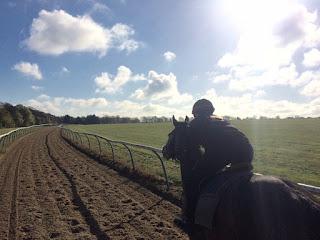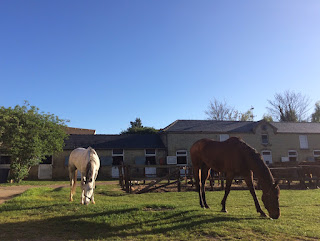My computer went into a coma the day after our trip to Fontwell. I took it into the mender's on the Monday. Having heard nothing by Thursday, I called in, to be greeted by the news that it's 50:50 whether it can be resuscitated. I would probably be given the verdict later in the day or the next day. Three days later I've heard nothing, which I do not take as a good sign. I suppose that it is good that the repair-man still hasn't admitted defeat, but the fact that it clearly has not yet made a resurrection is not encouraging. We'll see. Anyway, in the interim I'm using a borrowed one, but I've been loath to do too much with/on it, not least because I don't want to download any more stuff onto it than necessary.
PAYE is the biggest problem as one has to compile and return one's records via computers nowadays, and the software is on the indisposed (dying? dead?) machine. But we can worry about that anon. In the meantime, I shall download a few photographs onto this one, and just get this blog up to date. White Valiant's victory was tremendous. He is a very nice horse and I would have been disappointed if he had not won, but that wouldn't have been a surprise as disappointments come along all too regularly. Not on this occasion, though: he won, which was terrific in every respect.
I was particularly pleased for White Valiant's part-owner Bruce Atkinson, who was there with several members of his family and able to enjoy a red-letter day at one of his local courses. (He lives in Brighton). Bruce has been involved in a few nice horses over the years, and one nice touch was that he said that Peter Scudamore, father of our jockey Tom, had ridden his horse Great Light, trained by John Jenkins, into third place in the Victor Ludorum Hurdle at Haydock in 1983. That made an interesting angle, and it was also pleasing that we were able to help Tom Scudamore, an excellent jockey, to reach his target of 100 winners for the season, a total which he finally hit on the penultimate day of the campaign and which ended up as his final score.
I hope that White Valiant can go back to Fontwell on 6th June. And Roy (no surprises here) will, God willing, return to Brighton on 23rd May and then 12th June. It's always a pleasure to take Roy to Brighton and to spend some time there with my co-owners, and it's a particular pleasure when he wins, which he did on Tuesday, his first run of the year. He won well; but, even saying that, we were, yet again, indebted to the skill of John Egan in helping him to victory. Roy has now won six races at Brighton and none elsewhere, which is a remarkable total - as is the tally of his mum, Minnie's Mystery, who is now responsible for the winners of 30 races. And that is a sentence which I write both with pride and with boundless admiration for her merit and the merit of her offspring.
Aside from that, what's been happening? I really enjoyed the racing from Sandown on Friday, primarily because it provided, via the Group race wins of Robert Tart and James Sullivan, an illustration of what I regard as an often-overlooked fact that the main thing which separates the fashionable jockeys from the unfashionable ones is the quality of their mounts rather than the quality of their riding. The recent resurrection of Robert Tart's riding career has been a joy to behold. He's always been a good jockey, having initially been an excellent and very successful apprentice with Alan Bailey. However, his rides dried up once he had lost his claim, as so often happens, and he came close to disappearing off the map.
A couple of years ago I was looking for a good jockey who wasn't busy, and Robert was the obvious candidate. He was doing some stalls work for us (on a horse whom he rode in a few races). One day he reported that he wouldn't be able to make the same time the following week as he was going to start a job riding out for John Gosden on the Monday, because he was getting so few rides that he had no money coming in, and the safety net of a weekly wage would be a life-saver. (Taking a full-time riding-out job, of course, is something of a last resort for freelance jockeys as it means that they can't ride out for other people - well, they can before dawn and after lunch, but that's not always feasible - which further cuts down their chances of getting race-rides).
I was pleased that Robert was doing this. Not only would it provide financial security, but he would surely pick up the odd ride as John is very, very good in using the jockeys in the stable on his second-string and minor-meeting runners. And when a jockey starts being seen to be getting rides and riding winners for a top trainer, he starts picking up rides from other trainersBlogger: Stable Life - Create post as well. Of course Robert was a long way down the pecking order with (besides Frankie Dettori and William Buick) Rab Havlin and Nicky Mackay already there (and I think that Saleem Golam might have been there too at the time), but even in the first year he did get the odd ride on busy days. Roll on two years, and Rab is enduring a six-month suspension, while Nicky is on the sidelines for what will probably prove to be longer than that, courtesy of a femur badly broken in a fall at Chelmsford a few weeks ago.
Robert has consequently found himself nearer the front of the queue - and, of course, he has grabbed the opportunity with both hands. Which he would do, as he was never anything other than a very good jockey. It is very sad to see Rab and Nicky suffering such ill fortune, but the one consolation is that good has come out of bad, their absences allowing Robert to re-emerge from the wilderness. He has had a few winners at the minor meetings, and then on Friday John put him on the stable's second string in the Sandown Classic Trial - and, the first string (ridden by Frankie Dettori) running disappointingly, he won that too. Fingers crossed he can now enjoy the recognition and support which he has always deserved but which he has not been receiving for all too long.
If Robert does indeed return to the public eye, you can guarantee that we will hear and read that Robert is a much-improved jockey this season - but, believe me, he isn't. It's the same with William Kennedy, who has just ended a magnificent season with 63 winners, the bulk of them trained by Donald McCain. I've got sick of hearing that William is a much-improved jockey. He isn't. He's been a top-class jockey for over a decade. The first ride he had for us was on Lady Suffragette in a conditional jockeys' hurdle at Towcester in May 2007. She finished fourth of 17, beaten around a length. He rode her perfectly. No jockey alive could have ridden her any better.
William has been our principal National Hunt jockey over the subsequent decade, only really ceasing to be our regular rider over the past couple of year simply because he is at last in so much demand elsewhere - primarily on Donald's horses and primarily at northern meetings - that I found that he was rarely available. I have used him often enough over a long enough period to comment, and I can both confirm that the fair-weather pundits who are lauding him nowadays are correct to describe him as a top-class jockey, and also put them right by pointing out that he hasn't just become one, but has been one for at least a decade.
Richard Pitman called his autobiography, 'Good horses make good jockeys', reasoning that it was the ability of horses such as Crisp, Pendil, Lanzarote and Killiney who elevated him into the top tier. That's fair enough, but it's probably not as correct as one could make it. Good horses make successful jockeys, that's for sure. But I'm not sure that they make good jockeys. I think that what they do is allow good jockeys to be recognised as good jockeys - and it has been great recently to see William Kennedy, Robert Tart and James Sullivan, three riders who have been good jockeys for years, given the chance to join the man of the moment Robbie Power in supporting this contention.
On the subject of good jockeys, we'll have another one riding for us on Tuesday. Sussex Girl and Hope Is High will both resume at Yarmouth, in consecutive races. They both ought to run very well, even if Sussex Girl's run in a five-furlong maiden, only the second run of her life, might be something of a shot in the dark. She is by a sprinting stallion (Compton Place), seems to be the fastest horse in the stable and had no difficulty in making the running when she ran over six furlongs last season. However, set against that are the facts that, with the possible exception of her, we don't have any sprinters in the stable, so it's slightly hard to judge; and that she is a half-sister to our wonderful former inmate Ethics Girl (who was, admittedly, by a stayer, Hernando) who did all her winning between one mile and two miles. We'll see what Tuesday brings, for both runners.
You'll see that I have downloaded a few photographs onto this borrowed computer. We have White Valiant's victory (before, during and after) in the first three paragraphs, and Roy's win in the fourth. The two half-brothers are shown looking out of their adjacent stables in the eighth paragraph, while Roy is enjoying a post-exercise stroll around the yard on Friday morning in the tenth. White Valiant is cantering round Bury Hill on Friday morning with Ivona in the eleventh; while earlier in the piece we have two photographs of Indira and Lucinda on Long Hill at daybreak on Tuesday. Farther down we have Hope Is High and Jana at the top of Railway Land in the twelfth paragraph; John Egan on Sussex Girl, led by Jana, at the stalls later that morning in the penultimate paragraph; and the same little filly with Jana in Hamilton Road yesterday morning adorning this final paragraph.
















































